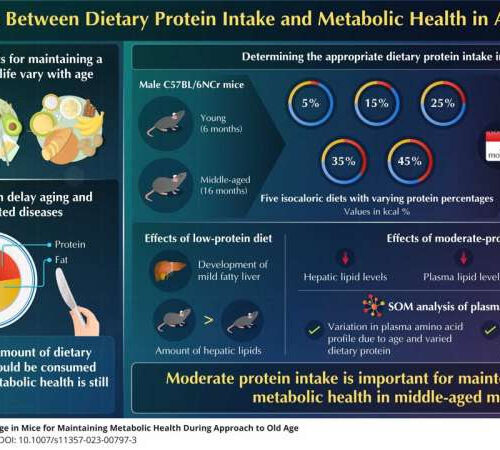by Waseda University In a new study by Waseda University researchers, young and middle-aged mice were fed isocaloric diets with varying amounts of protein. Mice consuming moderate amounts of dietary proteins (25% and 35%) exhibited lower blood glucose, and hepatic and plasma lipid levels. Credit: Yoshitaka Kondo from Waseda University As the proverb “You are what...
Category: <span>Nutrition & Dietics</span>
Popular diet increased life expectancy by as much as 35 percent, lab tests show
Scientists have examined the popular Mediterranean diet at the cellular level and found that its specific components and possibly the overall diet can increase life expectancy by up to 35 percent. This promising extension of life expectancy was demonstrated using a model laboratory organisms – worms. But the effects most likely exist in humans, too,...
Could low iron be making mental health symptoms worse?
by University of Michigan Credit: Pixabay/CC0 Public Domain Most people these days understand that mental health issues have their roots in physical differences in our brains, genes and bodies, and differences in our life experiences. But what you eat and how your body uses the nutrients in your food also matters to mental health. A growing...
Flavonol-rich foods like apples and blackberries can lower chances of developing frailty
by Hebrew SeniorLife Hinda and Arthur Marcus Institute for Aging Research Credit: Pixabay/CC0 Public Domain Eating plant-based foods that contain dietary compounds called flavonols can lower your chances of developing frailty. Foods like apples and blackberries that contain flavonoids called quercetin may be the most important for frailty prevention. Approximately 10% to 15% of older adults experience...
High-fat diet ‘turns up the thermostat’ on atherosclerosis
AMERICAN SOCIETY FOR BIOCHEMISTRY AND MOLECULAR BIOLOGY IMAGE: MICROSCOPY IMAGE OF A MOUSE AORTA WITH ATHEROSCLEROTIC LESIONS. PLAQUES ARE SHOWN IN RED. CREDIT: SRINIVASA REDDY In a recent study, researchers determined that derivatives of natural emulsifiers such as phospholipids found in high-fat, high-cholesterol diets can promote atherosclerosis via gut bacteria interactions with the immune system. This...
Frequent fried food consumption linked to anxiety and depression
by Bob Yirka, Medical Xpress Credit: Pixabay/CC0 Public Domain A team of food scientists at Zhejiang University, in China has found a possible link between frequent fried food consumption and increased levels of anxiety and depression in consumers. In their study, reported in Proceedings of the National Academy of Sciences, the group describes analyzed patient data...
Can Particles in Dairy and Beef Cause Cancer and MS?
Angela Speth, MD March 13, 2023 In our Western diet, dairy and beef are ubiquitous: Milk goes with coffee, melted cheese with pizza, and chili with rice. But what if dairy products and beef contained a new kind of pathogen that could infect you as a child and trigger cancer or multiple sclerosis (MS) 40-70 years later?...
Does Vitamin D Deficiency Cause Obesity or Vice Versa?
Caroline Apovian, MD December 27, 2022 Caroline Apovian, MD A recent study found that people with obesity have lower blood levels of vitamin D than people of healthy weight. This association of obesity with low vitamin D levels has led to much speculation on whether low vitamin D levels cause obesity or whether obesity causes low vitamin D levels. The interest in this...
How broccoli sprouts became an emerging tool against a range of diseases
by Ashley Stimpson, Johns Hopkins University Credit: Chloe Niclas Strolling through the produce section of your local grocery story, you might notice—tucked between the pre-sliced radishes and the plastic-wrapped mushrooms—a container of broccoli sprouts, a mat of wispy white shoots with spring-green leaves the shape of a handmade valentine. Perhaps you took that container home and...
Drinking alcohol brings no health benefits, study finds
by Dennis Thompson Dozens of studies have purportedly shown that a daily glass of wine or mug of beer could reduce your risk of heart disease and death. But these studies are flawed, a new evidence review asserts, and the potential health benefits of moderate alcohol use vanish when those flaws and biases are taken into account....





